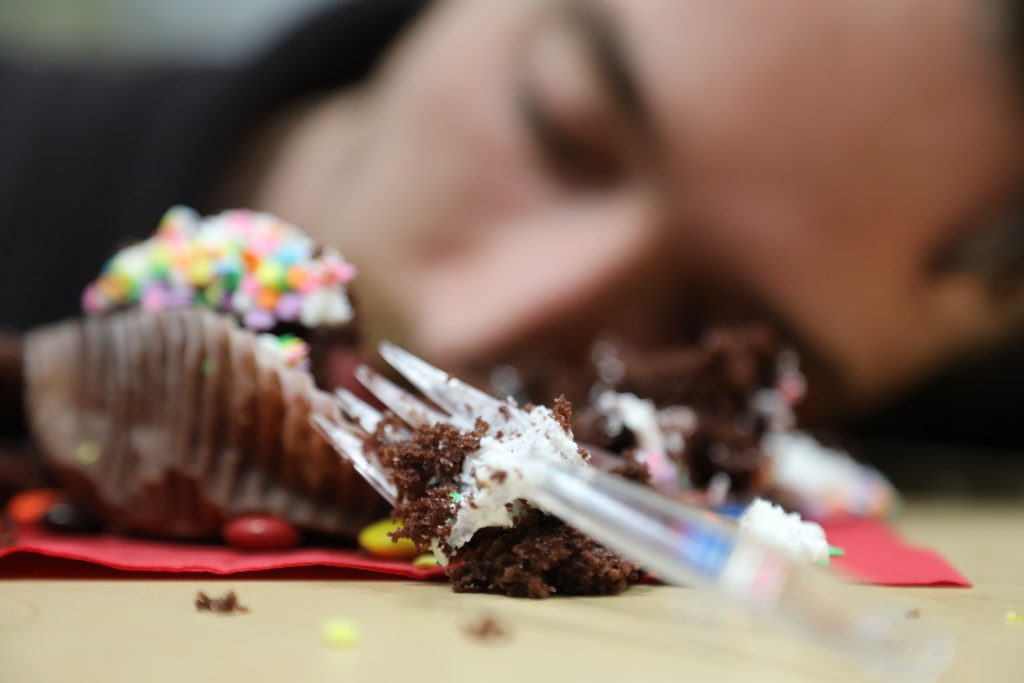By Jacob Vaughn
Copy Desk Chief & Music Editor

By Jacob Vaughn
Copy Desk Chief & Music Editor
Throughout the year, people gather with friends and family to stuff their faces as they share with their loved ones. They forget about the growing obesity epidemic in this country.
Several boxes of chocolate hearts on Valentine’s Day, a few too many candy eggs on Easter and too big a handful of candy corn on Halloween have all been normalized by years of tradition.
This needs to stop.
On average, people of normal body mass index, a person’s weight-to-height ratio, gain 1-2 pounds during the holidays, according to CNN. Those who are overweight or obese may gain up to 5 pounds. Researchers for a 2000 study published in the Nutrition Review determined that “holiday weight gain may be an important contributor to the rising prevalence of obesity, even though absolute values for weight gain in this study were less than anticipated.”
Trick-or-treaters consume over 3,000 calories from sweets alone during the fall holiday, according to Time. This is about 1,000 calories more than recommended by the National Heart, Lung, and Blood Institute for somewhat-active children ages 9-13.
As if it’s not enough that 30 percent of children knock back two or more sugary drinks a day, they are given full permission to pump their bodies with even more unhealthy calories on Halloween.
This grossly exceeds the daily recommended amount of added sugar – no more than 6 teaspoons – by the American Heart Organization, according to CNN.
Some results of abundant added sugar consumption are obesity, diabetes and fatty liver disease, the most common liver condition affecting children in the U.S. today, according to healthline.com.
This is not something that can be solved by a few extra hours in the gym. This is a systemic problem that requires radical change. There are, supposedly, steps being taken to combat excess sugar consumption.
According to Forbes, the Food and Drug Administration redesigned the Nutrition Facts label to include the categories of added sugars, sugar carbohydrates added to food and beverages during their production. Additionally, candy companies have announced their commitment to making serving sizes smaller.
While this is a step in the right direction, the effort seems too little, too late and hard to believe.
In the ’60s, the sugar industry funded research that highlighted the dangers of fat and dismissed the risk of to much sugar consumption, according to NPR.
One of the scientists involved in the research was named D. Mark Hegsted, according to The New York Times.
He later went on to become the head of nutrition at the U.S. Department of Agriculture and in 1977, helped draft the forerunner to the federal government’s dietary guidelines. Today, remnants of Hegsted’s research blaming saturated fat for heart disease can still be found in the government’s dietary guidelines.
Similar sugar-funded studies take place within candy companies. According to HuffPost, research conducted by a trade association representing Butterfinger, Hershey and Skittles determined that children who eat candy tend to be thinner than those who don’t. The Associated Press later conducted an investigation into the study revealing the candy industry’s ties likely influenced the results.
While the effects of sugar on health are still being put on the fence by the companies that profit from it, we should at least stop glorifying our societal sweet tooth during the holidays.
Every year, reports of tainted Halloween candy hit media outlets in the preceeding and following days of this sugar-packed holiday.
Often times, these prove to be rumors, according to Snopes.
However, what can be found is society’s ignorance for the potential health risks surrounding these outdated traditions.
It won’t be long before everyone looks back and wonders why such reckless decisionswere made in the name of these
special holidays.






